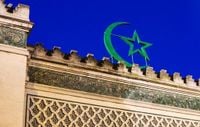Aïd el-Fitr, a significant celebration for Muslims, marks the end of the holy month of Ramadan. In 2025, this festive occasion is expected to be celebrated on March 30, although some communities may observe it on March 31, pending the sighting of the new moon. As Ramadan draws to a close, preparations are underway for this joyous event, which is steeped in tradition and community spirit.
The announcement regarding the end of Ramadan was made by the French Council of Muslim Worship (CFCM) on March 25, 2025. According to their calculations, the conjunction of the new moon will occur on March 29, 2025, at 11:58 Paris time, signaling the beginning of the month of Chawwâl, which includes Aïd el-Fitr. The CFCM stated, "The first day of Chawwâl (day of Aïd-el-Fitr) will be Sunday, March 30, 2025," based on astronomical data.
However, the official confirmation of the date will be provided during the 'Night of Doubt,' which will take place on March 29, 2025, at 18:00. This traditional observance involves the sighting of the crescent moon, and if it is visible, the end of the fast will be confirmed for March 30. If not, the celebration may be postponed to March 31. The Grande Mosquée de Paris has emphasized that they are the sole authority on this matter, and the date will be confirmed based on the moon sighting.
Ramadan 2025 began on March 1, and as the month of fasting comes to an end, many Muslims in France and around the world are preparing for Aïd el-Fitr with a sense of excitement and gratitude. This festival is not just a time for feasting but also a moment for reflection, community bonding, and charity.
Aïd el-Fitr is characterized by various customs and traditions. The day typically starts with a special congregational prayer at the mosque, where families come together to celebrate the end of their month-long fast. Following the prayer, it is customary to gather with family and friends for a festive meal, sharing dishes that vary widely across cultures. From sweet pastries to savory meat dishes, the culinary offerings are plentiful and often reflect family traditions.
In addition to the feasting, the spirit of Aïd el-Fitr is deeply rooted in acts of charity and generosity. Muslims are encouraged to give Zakat al-Fitr, a form of almsgiving that is obligatory for those who can afford it. This donation is intended to help those in need participate in the celebrations, ensuring that everyone can enjoy the joy of the occasion. The CFCM has set the reference amount for Zakat al-Fitr for 2025 at 9 euros per person.
As families prepare for Aïd el-Fitr, many engage in shopping for new clothes, gifts, and festive foods. This preparation is not just about the physical aspects of the celebration but also about cultivating a mindset of joy and gratitude. The sense of community during this time is palpable, as many participate in local events and gatherings to enhance the festive atmosphere.
The transition to summer time will also occur on the night of March 29 to March 30, 2025. This change may affect the timing of the evening meal (iftar) for those observing the fast, as they will need to adjust their schedules by one hour. Community leaders and mosques are expected to remind congregants of this change during the Friday prayers leading up to the holiday.
In the days leading up to Aïd el-Fitr, many Muslims reflect on the spiritual significance of Ramadan. This month is seen as a time for personal growth, self-discipline, and increased devotion. Many individuals take this opportunity to strengthen their faith, engage in prayer, and seek forgiveness. It’s a period of introspection and a chance to reset spiritually.
On the day of Aïd, the communal prayers serve as a reminder of unity and togetherness within the Muslim community. The sermon delivered by the imam often emphasizes the themes of gratitude, generosity, and the importance of supporting one another. After the prayers, it is common for families to visit relatives and friends, exchanging gifts and enjoying meals together, reinforcing familial bonds.
As Aïd el-Fitr approaches, community events and celebrations are being organized in various neighborhoods. These gatherings often include food stalls, cultural performances, and activities for children, fostering a sense of togetherness and joy. Such events highlight the rich cultural diversity within the Muslim community and provide an opportunity for sharing traditions with others.
In summary, Aïd el-Fitr in 2025 is set to be celebrated on March 30, marking the conclusion of Ramadan. This festival encapsulates a spirit of joy, sharing, and gratitude, as families come together to celebrate their faith and community. It is a time to reflect on the lessons learned during Ramadan and to extend kindness and generosity to those around us. As the date approaches, Muslims worldwide look forward to this cherished occasion, eager to partake in the festivities and strengthen their communal ties.






